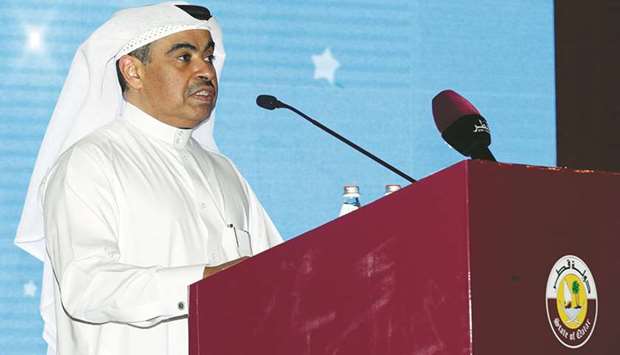HE the Minister of Commerce and Industry Ali bin Ahmed al-Kuwari has called for the activation of existing agreements between Qatar and Pakistan, whose trade volume witnessed a 104% growth to reach $1.6bn in 2017.
Speaking yesterday at the opening of the Qatari-Pakistani Business Forum held in Doha, al-Kuwari said bilateral trade could be further bolstered through the activation of a number of agreements that have been designed to promote economic and trade relations.
Al-Kuwari said both countries signed agreements in the field of economic co-operation in 1984 and the promotion and reciprocal protection of investments in 1999. “These friendly ties were cemented by the exchange of high-ranking official visits that reflected both countries’ keenness on strengthening co-operation across numerous fields, especially on the trade and investment levels,” he said.
The minister said 851 joint Qatari-Pakistani companies are currently operating in the Qatari market in the fields of energy, contracting, plastic industries, and the leasing of heavy equipment. Qatar is also home to six Pakistani-owned companies, he added.
He stressed that Qatar is looking forward to strengthening bilateral ties through the organisation of regular forums and trade exhibitions, as well as the exchange of bilateral visits to enhance joint co-operation between the public and private sectors in both countries.
International trade and investment form a key part of the future growth and diversification of Qatar’s economy, al-Kuwari pointed out. He noted that Qatar is seeking to capitalise on its strategic location between East and West, as well as its world-class facilities “to cement its position as a regional trade hub.”
“This strategy has reflected positively on Qatar’s foreign trade, which grew by 16% in 2017, driven by an 18% increase in Qatari exports. The contribution of the non-oil sector to GDP also rose to 52% in 2017, while real GDP at constant prices grew by 1.6 %.
“Qatar’s balanced economic approach is based on the policy of channelling oil and gas revenues into supporting all economic sectors. Through these policies, Qatar aims to transform national industries and trade sectors into active partners in achieving the objectives of the National Development Strategy 2018-2022,” al-Kuwari said.
Al-Kuwari said Qatar’s solid growth rate reflects the government’s success in prioritising the development of a favourable business climate in the trade and industrial sectors to build a strong production base that will achieve balanced economic growth for Qatar.
Quoting the latest World Bank report, al-Kuwari said Qatar’s national economy is set to grow by 2.8% in 2018 and an average of 3% in 2019-2020.
“Qatar’s balanced strategies and integrated business policies have reflected positively on the country’s ranking in numerous reports by international agencies, including the World Economic Forum’s Global Competitiveness Report 2018.
“Globally, Qatar ranks first in terms of stable inflation rates, sixth in terms of the effect of taxes on competition, eighth in terms of venture capital availability, and ninth in terms of financing small and medium enterprises,” al-Kuwari said.
He added: “These advanced rankings demonstrate that Qatar is home to a business-friendly environment, which welcomes investors who are looking to tap investment projects. Such investments will bolster Qatar’s knowledge-based economy, while offering foreign businessmen promising returns.”

HE the Minister of Commerce and Industry Ali bin Ahmed al-Kuwari speaking at the opening of the Qatari-Pakistani Business Forum held in Doha yesterday. PICTURE: Jayaram

